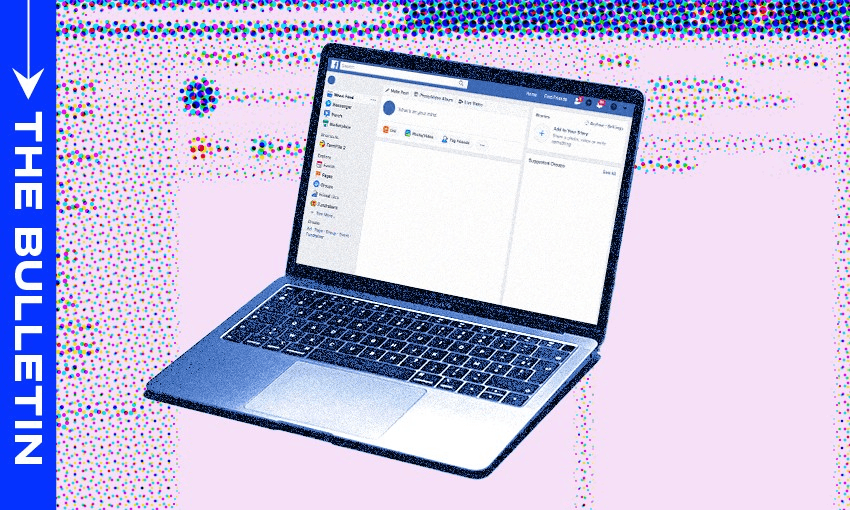In today’s extract from The Bulletin by Stewart Sowman-Lund: Why the Fair Digital News Bargaining Bill has split the coalition. To receive The Bulletin in full each weekday, sign up here.
A surprise announcement
Relief for the media is on the horizon, with news yesterday morning that the government will support the previous administration’s Fair Digital News Bargaining Bill – with some tweaks. It’s a significant U-turn on National’s previous views on the proposed legislation, as The Spinoff’s Duncan Greive explores today, though it does come with some complications for the government.
Act has confirmed it will not be supporting the bill, invoking the “agree to disagree” provision of the coalition agreement – the second time in a week this has been used, though the last was by New Zealand First. It’s also something of a surprise announcement – there was no mention of the media in the government’s quarterly action plan unveiled on Monday evening.
What’s all this?
You wouldn’t be alone if you’re a bit confused about what the bill is given its slightly ambiguous name. Greive’s piece this morning explains the lowdown on the bill, but, in short, it would help media companies make money off the fact that online tech giants like Facebook profit from sharing news content. It stems from a landmark 2021 law in Australia, but it took until late last year for our Labour government to introduce its version, with little movement before the October election. At that time, National was staunchly against it. By the time it made it through the select committee earlier this year, it seemed like it could be dead on arrival – National remained ambivalent, Act was against it and the select committee (initially) appeared to have recommended against passing it, as Newsroom’s Tim Murphy reported at the time.
Goldsmith announced that other changes to support media were in the pipeline, too. The Herald’s Shayne Currie reported that Shortland Street could be one major programme to benefit from a proposed tweak to the screen rebate scheme that would allow support for shows with “strong industry and cultural value”. The soap opera has been under review as part of cost cutting measures. Advertising restrictions for Sundays and public holidays will also be ditched. All of these “short-term measures” will be in place by the end of this year, said Goldsmith.
The minister that could
Paul Goldsmith has only been media minister for a couple of months, but in making yesterday’s announcement he has done what his predecessor – Melissa Lee – failed to do. Lee had been National’s media spokesperson for several years but lasted less than six months as a minister, turfed out of the portfolio and cabinet entirely. As media outlets started to crumble, Lee’s public comments made her seem out of touch with the industry she was advocating for.
Nevertheless, it’s not entirely surprising the government has come around to the Fair Digital News Bargaining Bill in some form. Back in February, as Newsroom reported, Lee acknowledged tech companies should pay for news content and blamed the select committee process for a delay in action being taken. “I think there are a lot of things missing from [the bill]. I have always said, if the platforms are actually monetising from the use of news, they should pay for it.” That already marked a significant shift from before the election. In May last year, reported BusinessDesk’s Daniel Dunkley, Lee compared the proposal to a new tax on big businesses. “I don’t believe it is the government’s role to dictate how the media should operate,” she said. A lot happened over the past year that may have prompted this change of heart, most prominent being confirmation that Newshub would be pulled off the air in July. This recap of the 14 months to February in media news makes for sober reading.
The timeliness of the announcement can’t be overstated. Newshub will air its final programme on Friday night, TVNZ continues to face questions about its profitability, and just yesterday, Te Ao Māori News reported Whakaata Māori was facing potential cuts as it undergoes a review of its organisational structure. Whether this bill could have saved the jobs already lost in the media industry is unknown, though Greive argues it could “build a sustainability for local news media” going forward.
Coalition squabbles
National’s endorsement is good news for the bill, but it won’t be enough. Act’s David Seymour, in a statement reported here by RNZ, said the proposed legislation wouldn’t help the media and has confirmed his party won’t support it. It’s less than a week after New Zealand First also raised objections to a government proposal, similarly invoking the “agree to disagree” provision, as we covered in The Bulletin on Thursday. As Newsroom Pro’s Laura Walters looks at today (paywalled), this might not be the last time the coalition partners squabble in public over policy. The bill’s future relies on support from any of the three opposition parties. Even Te Pāti Māori’s six votes would be enough to see it pass, RNZ noted. Labour’s Willie Jackson told reporters he would take time to look at the government’s amendments, but supported the intent of the bill.
The bill has also been well-received within the media industry, noted Currie at the Herald, with the News Publishers’ Association saying it was confident the legislation would lead to additional revenue. Earlier this year, The Spinoff canvassed media bosses on a range of topics, with the likes of TVNZ’s Jodi O’Donnell in favour of the bill. Meta, one of the tech companies in the spotlight, has been less favourable, reported Newshub. The company has a track record of discontent with laws like this – previously shutting news content off Facebook feeds in Canada and Australia just to make a point.
